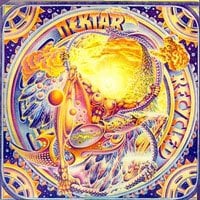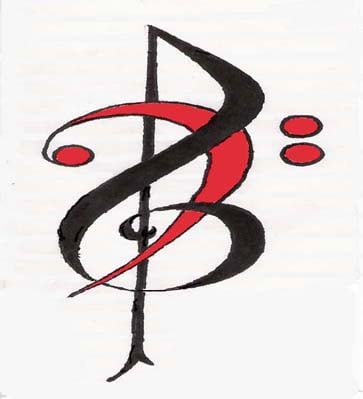| Author |
 Topic Search Topic Search  Topic Options Topic Options
|
Tony R 
Special Collaborator


Honorary Collaborator / Retired Admin
Joined: July 16 2004
Location: UK
Status: Offline
Points: 11985
|
 Posted: March 29 2007 at 18:44 Posted: March 29 2007 at 18:44 |
ironically the guy at the back reminds me of Trickster F..
maybe they are proto-prog metal after all....
|
 |
MikeEnRegalia 
Special Collaborator


Honorary Collaborator
Joined: April 22 2005
Location: Sweden
Status: Offline
Points: 21847
|
 Posted: March 29 2007 at 18:45 Posted: March 29 2007 at 18:45 |
^^ so Sting was right when he wrote these lyrics: "Its prog by numbers, one, two, three It's as easy to learn as your ABC" thanks for injecting some humor into this thread! 
|
|
|
 |
Tony R 
Special Collaborator


Honorary Collaborator / Retired Admin
Joined: July 16 2004
Location: UK
Status: Offline
Points: 11985
|
 Posted: March 29 2007 at 18:50 Posted: March 29 2007 at 18:50 |
 MikeEnRegalia wrote: MikeEnRegalia wrote:
^^ so Sting was right when he wrote these lyrics:
"Its prog by numbers, one, two, three
It's as easy to learn as your ABC"
thanks for injecting some humor into this thread! |
and thanks for the ultra fast witty retort.. 
Now what were you guys arguing about...let me guess...err. Prog Metal..?
Has anyone mentioned "death" metal or growling yet..?
Of course the have. The perennial twin achilles heals of Prog Metal.
Has anyone suggested LORDI for Prog Metal-Related yet?
|
 |
MikeEnRegalia 
Special Collaborator


Honorary Collaborator
Joined: April 22 2005
Location: Sweden
Status: Offline
Points: 21847
|
 Posted: March 29 2007 at 18:53 Posted: March 29 2007 at 18:53 |
^ not to mention Black Metal or Sludge ... 
|
|
|
 |
Peter 
Special Collaborator


Honorary Collaborator
Joined: January 31 2004
Location: Canada
Status: Offline
Points: 9669
|
 Posted: March 29 2007 at 19:09 Posted: March 29 2007 at 19:09 |
Re the whole "progressive" thing (as the dictionary would have it) you guys are arguing about, lots of neo prog is not truly "progressive" because it is actually regressive -- it follows the established patterns and cliches of classic prog.
But as far as "sounding like prog," goes, obviously hearkening back to the old sound is good enough for inclusion (see Misplaced Childhood, and countless other neo albums).
Now, doesn't PM often incorporate "sounds like" elements from classic prog (fast, flashy synth solos, etc.)? Isn't that really why it is here? If not, then when will the modern, "updated" "progressive" forms of other music genres be added? Where's the alt-country? Where's my Wilco? Fairport Convention are here (a mistake, IMO), but where is the rest of the Celtic stuff that's played on electric instruments, and incorporates synths? Are the Pogues a "progression" on old-style Irish traditional? (And no, I don't really think they fit here -- because they sound nothing like prog!)
If we rigidly demand "progression" as per the dictionary, don't we have to remove most of the stuff that's listed here, including many albums by classic prog acts, where the overall sound changed little, if at all, from one album to the next? (while still sounding like prog -- see A Trick of the Tail to Wind & Wuthering, to And Then There Were Three -- was there truly "progression" there? 
 You're working with too rigid and "linguistic/mathematical" a definition of "progressive," folks, IMHO! a dangerous route to take, and one which most of us will never relate to.
Such an exacting criteria is never going to happen, and not really what it's all about, anyway. Don't get hung up on the word "progressive," and counting notes & chord changes, is my advice -- step back from the microscope, Poindexter, and listen to your heart.
Because if that's really how you want it played out, then Sting is a "progression" from the Police, maybe ska is a "progression" from reggae, PIL is a "progression" from the Sex Pistols, John Lee Hooker from Robert Johnson, and Shania Twain might even be a "progression" from Hank Williams.
Stop trying to quantify, categorize and pin down art via your "math" and "weights and measures," guys! It misses the whole point of art as an emotional, subjective, fluid thing. You'll never "apprehend" it that way, or achieve concensus! 
Just my three cents worth -- make of it what you will. No big deal. 
Edited by Peter Rideout - March 29 2007 at 22:33
|
|
"And, has thou slain the Jabberwock?
Come to my arms, my beamish boy!
O frabjous day! Callooh! Callay!'
He chortled in his joy.
|
 |
sircosick 
Forum Senior Member

Joined: January 29 2007
Location: Chile
Status: Offline
Points: 1264
|
 Posted: March 29 2007 at 19:10 Posted: March 29 2007 at 19:10 |
I'm baaaaaaaack!!!! Again: the problem with prog metal could be compared to J-Tull's "A Passion Play": this one is as hated as loved by most of prog fans; hated and loved for the same reason: controversy. People with prog tastes used to listen progressive music because it was so delightful in its golden years, and that prog rock is far from makes some agressive noise, although suddendly we can find some strong guitar riffs near to metal (Hocus Pocus, for example) into the early prog acts catalog. Did you hear this sentence?: "Metallica brought music back to earth"......... And well...... That's for me an awful start for bringing music "back to earth". When metal appeared in early 80's decade, then it was mixed with prog; some of the first bands as a result from this terrible combination was Dream Theater, that has agressive riffs and makes, in general, noisy and ultra-sofisticated music; I mean, noisy for a progger that used to listen to bands like Genesis, Yes or Rush. That is that controversy and the reason why prog metal has a serious problem as a direct prog sub-genre.  
|
 |
Tony R 
Special Collaborator


Honorary Collaborator / Retired Admin
Joined: July 16 2004
Location: UK
Status: Offline
Points: 11985
|
 Posted: March 29 2007 at 19:15 Posted: March 29 2007 at 19:15 |
 sircosick wrote: sircosick wrote:
I'm baaaaaaaack!!!! |
Is that meant to be ingratiating?
Well it's not, it's just plain irritating........makes it look like you are out to cause trouble.
Mind how you go...
|
 |
MikeEnRegalia 
Special Collaborator


Honorary Collaborator
Joined: April 22 2005
Location: Sweden
Status: Offline
Points: 21847
|
 Posted: March 29 2007 at 19:21 Posted: March 29 2007 at 19:21 |
|
|
|
|
 |
Peter 
Special Collaborator


Honorary Collaborator
Joined: January 31 2004
Location: Canada
Status: Offline
Points: 9669
|
 Posted: March 29 2007 at 19:36 Posted: March 29 2007 at 19:36 |
 MikeEnRegalia wrote: MikeEnRegalia wrote:
 Peter Rideout wrote: Peter Rideout wrote:
Stop trying to quantify, categorize and pin down art via your "math" and "weights and measures," guys! It misses the whole point of art as an emotional, subjective, fluid thing. You'll never "apprehend" it that way, or achieve concensus! 
|
I'm not really trying to quantify music ... not with the ranking algorithm and also not with the rating system on my website. Have a look at it if you're interested (http://progtology.com), I recently introduced labels like "very good" and "excellent" to go with the numeric ratings, to make it a little less abstract.
|
Cool -- good idea, I'd say. 
BTW Mike, I'm really defending PM's place here, above, as I can HEAR the elements of old prog that it incorporates.
To me, that's what gets artists and genres added here -- not a need for changes or additions to music, because then we'd have to add, for example, late 70s New Wave as a "progression" upon classic mid 70s rock, grunge as some sort of "progression" upon... er... whatever it's a progression upon, ETC ETC!
Does what I'm trying to say make any sense to you, or anyone? Does the dictionary (and perhaps the calendar, the calculator and the stopwatch) really determine what is prog, and thus fits in here?
Again, of course, the real problem is that the term "progressive," re music, is hopelessly outdated, highly subjective, and essentially meaningless. In a very real, fundamental sense, Vibrationbaby was right on when he stated that "prog" is a thing of the past.
In short, prog was.
Maybe it should have been called by a non-word -- "zog" or something....
'Cause that pesky "P" word causes a whole lotta trouble 'round these parts! 
Edited by Peter Rideout - March 29 2007 at 22:37
|
|
"And, has thou slain the Jabberwock?
Come to my arms, my beamish boy!
O frabjous day! Callooh! Callay!'
He chortled in his joy.
|
 |
FruMp 
Prog Reviewer

Joined: September 16 2005
Location: Australia
Status: Offline
Points: 322
|
 Posted: March 30 2007 at 04:17 Posted: March 30 2007 at 04:17 |
|
I still put it down to the cheese factor - let's look at some well known prog metal bands:
Symphony X : cheese
Ayreon : scandanavian cheese (into the electric castle owns but the human equation is pure prog metal cheese)
Angra: cheese
Queensryche: 80s cheese
Dream Theatre: cheese KINGS
All prog/power: cheese
Edited by FruMp - March 30 2007 at 04:18
|
|
|
 |
Certif1ed 
Special Collaborator


Honorary Collaborator
Joined: April 08 2004
Location: England
Status: Offline
Points: 7559
|
 Posted: March 30 2007 at 05:19 Posted: March 30 2007 at 05:19 |
 Trademark wrote: Trademark wrote:
T:
The Musical Box is a more traditional musical structure than Supper's Ready. Supper's Ready is what theorists would call an "episodic" composition. In other words it is a group of short "songs" glued together with some transitional material.
The Musical Box comes much closer to utilizing a more "classical" approach to form. The opening section (up to about 4:00) could be seen as either a sonata form exposition (the themes are too closely related in character for me to agree with this, but some might see it) or as a set of variations. The melodic and harmonic material here lends itself to the type of textural variation that early Genesis were so adept at creating. They take the same basic progression (in this case without even changing the key) and re-work it is a number of subtle ways. I see the beginning as intro and A section which could be further briooken down into A1, A2, A3 if you want to delineate the variations.
This is followed by the loud, fast section which in my own analysis would be a B section. It doesn't have enough direct relation to the opening material to be a true development section in my opinion.
A short recap of the A section follows. The return of the opening material is not extensive enough to make it a recapitulation, so once we get to this point we can pretty much throw Sonata form out the window as far as this tune is concerned.
The Now, Now, Now" Coda which is related to the B Section, but not a repeat of it, closes the piece out.
So what you get is Intro-A-B-A1-Coda. A very typical song form from the Romantic era that you might see in Schubert and would certainly be seeing reguarly by the time of Wolf and Mahler.
Whether you, personally find trhis a more complex structure than the episodic one used in Supper's Ready, I can't say. In some ways it might look simpler because of the re-use of some melodic material, but from a compositional stand-ppoint this type of composition is a great deal more challenging than an episodic one as I mentioned above. I think this is what Cert may be tallking about when he says Learning To Live is simpler in structure. Pastiche or collage techniques are not as difficult to create as really creative structured work.
|
"Supper's Ready" could be seen as a medley, with a recapitulation of the first song idea and loose thematic development acting as glue throughout the "piece" to give a through-composed feel - a bit like Dark Side of the Moon. You could say that Genesis "cheated" here, and that the overall structure is only as good as the sum of its parts - hence is somewhat simpler than you might think.
"Musical Box", on the other hand, can be broken down much further, and it is this fine-grain crystallisation that makes it so special from a compositional standpoint - the piece feels spontaneous and composed at the same time - a hallmark of much Prog that is widely regarded to be "Classic" or "Great". It is this form that absolutely seems to typify the best in Prog, from my research.
 Trademark wrote: Trademark wrote:
I must say I disagree with him when he says musical form is about the entire work. Nearly 9 years of study have taught me that musical form is about the structure, the building blocks. You can have a text-book piece in any of the known forms and it can be terrible. You can also have pieces that slip ansd slide around the "rules" to some extent which are great.
|
Musical form is about the entire work, not the building blocks - the building blocks are useful handles - ways of describing and getting a handle on the overall form, but many people overlook the fact that the other basic elements of music (rhythm, timbre, harmony, melody) all play a part in musical form, especially when you get to the Romantic era and beyond.
As I said earlier, boiling down is easy, and you can get lost in it to the point that everything ends up as sections - but do you examine the sections at a "high" level or a low level?
As you correctly point out, much of The Musical Box is about subtle variations to perceivable sections - which is a very artistic way of composing (think Beethoven's 5th).
I apologise for the fact that this is somewhat dry, but I'm limited by time, so sticking to the facts as I hear them;
Musical Box starts with an intro, then gives us the first verse (idea A), which is a clever contruction in itself, being made up of a "questioning" phrase, followed by 3 answers, the second of which is in a contrasting tone to the others, and is timbrally enhanced giving further "shape" to this verse idea.
There is a brief link to the second verse, which is timbrally different to the first, and features a short guitar motif that appears in varied form later on the piece.
Idea B follows; "Play me my song..." - the material is notably different - and features a new keyboard motif and the introduction idea. This is iterated, giving a decidedly non-standard A-A-B-B structure to this point. We can simplify it to A-B.
Idea C follows - a guitar riff that reminds me of Hawkwind's "Magnu", and the material that follows is actually a developed form of A+B, before idea D (another variation of A) arrives; "Just a little bit more time". There is more textural development with vocal harmonies and guitar counter-melodies.
Idea E sports a key change; whilst D could be seen as an extension of C, and the two combined a variation of A and B, this is a new idea, which could be considered as part B of the bridge, if C and D are part A.
Gods, I'll just call this entire section C, followed by A-B, for over-simplification.
A "rippling" idea follows a "section" that appears to comprise 2 new ideas - or thematic developments in which the flute counterpoints with the guitar - this "rippling" idea also being a thematic development (variation, if you must), but the next guitar and flute idea is a complete contrast.
So there are 4 ideas or developments in what is possibly part C of the bridge - and we would be well to consider it a bridge, as it links one set of lyrical and musical ideas to the next: we'll call it D.
Or it would be the next, if Genesis hadn't decided to recapitulate idea B at this point (it makes sense in the dramatic flow of the story, so you get the feeling that the piece is structured around the story, not around any kind of inherited formal structure).
To date, at the simplest possible level, we have an A-B-C-D-B structure.
The "heavy" section follows - another instrumental bridge - that begins with 2 iterations of 2 new ideas, the first in contrasting major and minor sections - see how use of harmony is also an active ingredient in manipulating the form? The second idea comprises guitar runs, and seems to serve as a link to the next iteration, and to the next new idea.
This new idea is the "Old King Cole" lyric section - verse, if you must, although the material has changed somewhat. The idea is iterated 3 times, and the guitar run motif is included as a leitmotif of this character - I have to say that I've been somewhat remiss in keeping up with the leitmotif details, but this all adds to the form.
In terms of structure, we're up to A-B-C-D-B-A (having simplified the bridges to independent sections, and stripped out the re-iterations).
There is a short link by way of a new musical idea (and the clock...) to the next heavy section - the climax, if you will.
The construction of this heavy section is similar to the previous one, but the music is more dense, both timbrally and in terms of arrangement, and becomes dissonant at the peak of the climax.
I'll call this D, as it's clearly a development of D ideas.
The vocal section that follows is a magnificent thematic variation - in my opinion... a wistful melody "She's a lady, she's got time...". This is based on A+B, but also carries inferences of the first instrumental break - it's worth noting that this cross-referencing of musical motifs and ideas is a very, very unusual (one might say progressive) aspect of rock music in the 1970s - although fairly typical of "Classical" (more specifically Romantic) music.
I want to call this E, so I shall - but you can call it A if you like.
What follows is more thematic variation (A) that leads to the coda. (F).
To summarise;
A-B-C-D-B-A-E-A-F at what I percieve to be the simplest level - ignoring swathes of develeopment, but I would prefer A-A-B-B-C-D-B-A-A-A-E-A-F.
Before Progressive Rock, the closest you ever got to "Classical" music in popular music was the orchestral backing on a Motown record. Formally, variances from A-B-A-B-C-A-B were few and far between. Hence, form is what marks Prog Rock from "standard" rock more clearly than almost anything else. Timbre is probably second, followed by rhythm and melody. Some Prog Rock bands even tried to shake off diatonic harmony - but they tended to be the exception.
(from generalisations R Us  )
Having largely ignored other aspects of formal development - and remember, we're talking about Rock music here - references to "Classical" music should retain that context;
 Trademark wrote: Trademark wrote:
What I'm think I am seeing in this discussion is the idea that the episodic structures are more complex than the more traditional ones, and from the particular vantage point someone with a lot of formal music training, I can say with absolute confidence that this is NOT true. They are interesting and have lots of contrasts and other types of shifts in tonality and tempo, but as odd as it might sound this does not make them more complex, only more varied.
|
I'd say that largely depends - it's not what you do, it's how you do it.
And, as someone with a modicum of formal training, I hold the Theme and Variations style of writing in very high regard - your distinction between complex and varied is not clear.
And T...
Bring back your sig!
|
|
The important thing is not to stop questioning.
|
 |
MikeEnRegalia 
Special Collaborator


Honorary Collaborator
Joined: April 22 2005
Location: Sweden
Status: Offline
Points: 21847
|
 Posted: March 30 2007 at 07:01 Posted: March 30 2007 at 07:01 |
 FruMp wrote: FruMp wrote:
Ayreon : scandanavian cheese (into the electric castle owns but the human equation is pure prog metal cheese)
|
Ayreon is from the Netherlands. 
|
|
|
 |
Sasquamo 
Forum Senior Member


Joined: September 26 2006
Location: United States
Status: Offline
Points: 828
|
 Posted: March 30 2007 at 10:40 Posted: March 30 2007 at 10:40 |
|
Do you think this AABCDA stuff was going through their heads when they wrote it? I think they just wrote the song. And besides, I've come to realize that individual musicianship and what the music sounds like is more important than it's compositional structure, or different time signatures.
|
 |
Trademark 
Forum Senior Member


Joined: November 21 2006
Location: oHIo
Status: Offline
Points: 1009
|
 Posted: March 30 2007 at 10:56 Posted: March 30 2007 at 10:56 |
|
The ABA stuff does run through the heads of writers of music (or at least it had better). Stucture doesn't happen by accident or intuition, or just because you want it to. You have to work it out. here's an example:
You play (or write) something you like, and then play (or write) something else and so on. Sooner or later you have a bunch of bits and pieces to look at and see how they fit (or don't fit) together. You then make adjustments, change things around, or write new material to connect your bits and pieces together, and suddenly you've got an ABA (or similar) structure. If you do not do something like this your music meanders all over the place nad has no continuity. Believe me, I've graded enough beginning composition projects to know what happens when structure is ignored.
In really, REALLY, simplistic terms, that's how composition works. When you say "what the music sounds like" you are including careful attention to structure on the part of the writer, because that structure is a major part of "what the music sounds like".
Music in which individual musicianship and attention to instrumental tone are given preference over a balance of structure AND musicianship is not pleasing music to very many people. I would put Yngvie Malmsteen forward as an example of musicianSHIP being featured over and above the issue of musiCALITY. When you listen you say, "WOW, this guy can really play", instead of, "WOW, what a great song".
|
 |
FruMp 
Prog Reviewer

Joined: September 16 2005
Location: Australia
Status: Offline
Points: 322
|
 Posted: March 30 2007 at 14:01 Posted: March 30 2007 at 14:01 |
|
|
|
|
 |
MikeEnRegalia 
Special Collaborator


Honorary Collaborator
Joined: April 22 2005
Location: Sweden
Status: Offline
Points: 21847
|
 Posted: March 30 2007 at 14:12 Posted: March 30 2007 at 14:12 |
^ yes, but the Dutch make better cheese - or at least they have a reputation for these dairy products! 
Edited by MikeEnRegalia - March 30 2007 at 14:12
|
|
|
 |
The T 
Special Collaborator


Honorary Collaborator
Joined: October 16 2006
Location: FL, USA
Status: Offline
Points: 17493
|
 Posted: March 30 2007 at 15:32 Posted: March 30 2007 at 15:32 |
 Peter Rideout wrote: Peter Rideout wrote:
Re the whole "progressive" thing (as the dictionary would have it) you guys are arguing about, lots of neo prog is not truly "progressive" because it is actually regressive -- it follows the established patterns and cliches of classic prog.
But as far as "sounding like prog," goes, obviously hearkening back to the old sound is good enough for inclusion (see Misplaced Childhood, and countless other neo albums).
Now, doesn't PM often incorporate "sounds like" elements from classic prog (fast, flashy synth solos, etc.)? Isn't that really why it is here? If not, then when will the modern, "updated" "progressive" forms of other music genres be added? Where's the alt-country? Where's my Wilco? Fairport Convention are here (a mistake, IMO), but where is the rest of the Celtic stuff that's played on electric instruments, and incorporates synths? Are the Pogues a "progression" on old-style Irish traditional? (And no, I don't really think they fit here -- because they sound nothing like prog!)
If we rigidly demand "progression" as per the dictionary, don't we have to remove most of the stuff that's listed here, including many albums by classic prog acts, where the overall sound changed little, if at all, from one album to the next? (while still sounding like prog -- see A Trick of the Tail to Wind & Wuthering, to And Then There Were Three -- was there truly "progression" there? 
 You're working with too rigid and "linguistic/mathematical" a definition of "progressive," folks, IMHO! a dangerous route to take, and one which most of us will never relate to.
Such an exacting criteria is never going to happen, and not really what it's all about, anyway. Don't get hung up on the word "progressive," and counting notes & chord changes, is my advice -- step back from the microscope, Poindexter, and listen to your heart.
Because if that's really how you want it played out, then Sting is a "progression" from the Police, maybe ska is a "progression" from reggae, PIL is a "progression" from the Sex Pistols, John Lee Hooker from Robert Johnson, and Shania Twain might even be a "progression" from Hank Williams.
Stop trying to quantify, categorize and pin down art via your "math" and "weights and measures," guys! It misses the whole point of art as an emotional, subjective, fluid thing. You'll never "apprehend" it that way, or achieve concensus! 
Just my three cents worth -- make of it what you will. No big deal.  |
(after my "Hello, I'm The T" post, of course....  )
|
|
|
 |
The T 
Special Collaborator


Honorary Collaborator
Joined: October 16 2006
Location: FL, USA
Status: Offline
Points: 17493
|
 Posted: March 30 2007 at 15:34 Posted: March 30 2007 at 15:34 |
 FruMp wrote: FruMp wrote:
I still put it down to the cheese factor - let's look at some well known prog metal bands:
Symphony X : cheese
Ayreon : scandanavian cheese (into the electric castle owns but the human equation is pure prog metal cheese)
Angra: cheese
Queensryche: 80s cheese
Dream Theatre: cheese KINGS
All prog/power: cheese
|
 worst post of all time 
(after my last post before my last before the one that precede this one, of course  )
|
|
|
 |
chamberry 
Special Collaborator

Honorary Collaborator
Joined: October 24 2005
Location: Puerto Rico
Status: Offline
Points: 9008
|
 Posted: March 30 2007 at 15:47 Posted: March 30 2007 at 15:47 |
|
Problem with prog metal? What's that? Let's see:
Too unemotional or emotionally deprived? There's emotion in every single type of music no matter how cold it may seem. If you think Dream Theater is emotionless, then why are you looking for emotions in Dream Theater clones?
Too complex? The last time I checked, In the Woods, Isis, Neurosis, Indukti, Agalloch and Subterranean Masquerade didn't sounded complex at all.
They're all a bunch of show offs? Look at the question above you for answers. And there's many more where that came from.
Its just metal with virtuosos playing it. I don't see anyone complaining about virtuosity in 70's 80's or 90's prog, why complain about it now? Oh, and not every prog metal artist is a virtuoso. Thats a silly generalization (and not the only one I've seen around here...)
Please don't make blind negative generalizations by only listening to 5-10 popular bands from the genre. That's not even HALF of what prog metal has to give. Try digging a little deeper.
|
|
|
 |
The T 
Special Collaborator


Honorary Collaborator
Joined: October 16 2006
Location: FL, USA
Status: Offline
Points: 17493
|
 Posted: March 30 2007 at 19:12 Posted: March 30 2007 at 19:12 |
I think the main problem is also this one: we're misunderstanding the essence of prog-metal and we're giving it a name that just doesn't fit.
Let's talk about the name. So let's agree for a minute that form and the development of it was one of the basic premises of the original progressive rock. We can say, then, that prog-metal in fact is not AS prog as we'd like it to be, OK. But let's also agree that about 70% of the genres listed in this site also disagree with the principle of form-as-basis for "progressiveness". We can safely say that most RIO, Art-rock, Electronic/space, and all the others, are not exactly here BECAUSE of form, but for other factors. Many "art-rock" bands play music in common structures that don't deviate from the norm a little bit, but they add instrumentation, they add colors, they add textures, they play with harmonies in ways that regular rock bands don't do. So we include them here. That's the same with prog-metal. It may have the wrong name, we shoud call it, as Teacher-Peter suggested, Zog-Metal or something, because it's true that it's not as closely related to the original prog-rock as the name would imply, but the genre still deserves to be here, and that will be part of my second point. Form is not the basis for inclusion in PA, and hence, we can say that most 80% of the members in PA don't think band X or Y is prog because of their work with forms. And as we can safely say that genres don't EXIST, but we CREATE them for researching and other purposes, it's OUR prerrogative ("our" in this case meaning the owners of the site, the collaborators and ALSO the regular members who make this place a living entity) to have certain particular set of guidelines as to decide whether to call a band prog or not. I agree: prog-metal is not TRULY "prog" if we use the original meaning of the expression (if it ever had one and only one) but it is "prog" because it falls into what we think as prog.
The second point I want to make is this: one of the biggest reasons for many of us loving and categorizing bands as "prog" is because they are in it FIRST for the music, SECOND for the cash or whatever else you may think of. In the past, in the glorious days of music, what moved musicians? Let's say first that in earlier centuries, performer and composer were two different things. We had lots of examples of composers-performers (Lizst, Beethoven, Bruckner, etc... Hundreds in fact!  ) but most of the times the music was composed FOR SOMEBODY ELSE TO PLAY IT. What do I want to say with it? Composers wrote music for MUSIC's SAKE first and foremost. (Well, if we dug deep in the corners of the subconcious we may say that it was egotistical reasons or self-satisfaction that moved them and artists in general, but let's leave this out of the picture for now). They didn't have "celebrity" or "the classical music hall of fame" or "MTV Viola Da Gamba Awards" in mind, they just composed because it was their passion, and that's why they spent so many years in developing... music!!! Who would actually devote years and years to a single symphony? Who would dedicate his life to discover the intrincacies of keys and harmonies? Who would write a treaty on counterpoint and fugue as his last work, one that surely wasn't going to be "popular"? Yes, they did it for money, too (hey, they had to eat, they had ladies to entertain, they had "bills" to pay), but that was just the regular "my craft, my profession, my way of live" thing, not the race-for-money-and-cars-and-ho's as it is today. They did it for the music.
What does that have to do with prog and prog-metal? Well, something. (that was a poor sentence  ). No, seriously. What we distinguish in most prog-metal bands is that what they do is usually not very "mass-oriented" music, they play metal, sure, but they don't play the metal that sells millions or moves crowds. They do it the other way. They care for music first, fame later. Do you really think Metallica tried to do anything with their music? No, they wrote and played the music they COULD play and they loved to play, the one that reflected their attituted, and that's fine. Many of the bands we call "prog-metallers" do "weird" things with their songs: 20 minute songs? extended solos? sudden rhythm changes? unusual orchestration and instruments? Ok, many of those attempt at going "over the genre" may be flawed and sound, to the ears of the conosseiur, as bombastic, pretentious, erroneous, superflous, whatever "ous" you can find.... But that's the thing that, in the minds of many of us, MAKES PROG: the attempt to TRY IT, the desire to GO FOR IT even if the results are ridiculous. To use the much-maligned and hated Images&Words by Dream Theater example (attention: not that I am particularly fond of this band): yes, I will say (for the sake of my argument, NOT BECAUSE I BELIEVE IT  ) that the music is overblown and there's too many solos and that "Learning to Live"'s structure is not incredibly complex and that John Petrucci smells kind of funny and that Mike Portnoy appears to be on crack and whatever you want... just one thing: DID, or DID IT NOT, this awful album, change history for metal (or for "prog"-metal, better said)? NONE will be able to deny this. Even if you try and say Queensyche or Fates Warning were the first ones, it was I&W that changed everything for the genre. (If not, there wouldn't be som many DT-clones out there... And better start realizing something: is not the fault of the original band that clones start appearing) Ok, so what's this have to do with anything? The fact that, as flawed as that awful album may be, it WAS AN ATTEMPT TO MAKE MORE OUT OF METAL. Maybe not in form, maybe they didn't accomplish it (again, I don't believe it, but for my argument's sake), but they DID IT FOR MUSICAL REASONS ANYWAY. Extended songs? Abrupt time changes? Solo after solo after solo? You may say whatever you want about those elements being exaggerated or not "true prog", I may even agree if we agree that "true prog" is a concept related to form first and foremost. But you WON'T BE ABLE to say that those elements weren't a true attempt to take metal a little further than what your regular Metallica tried.
And THAT"S what makes them prog, maybe not "prog" in the true sense of the word, but PROG in the sense that MOST PROG-FANS use and understand.
The problem with prog-metal? I guess the problem lies in trying to analyze it with othher genres and structures in mind.
Analyze it for what it is, love it for what it is. Just metal. More complicated metal, metal created for music's sake, metal created by trying to make it more interesting, metal written with much more difficulties than your regular 5 minute, one key Metallica song. But still METAL.
Metal in essence is a little noisy. You know, the chords and tones used in the genre are not particularly "loveable". But these musicians try, within the borders of that limitant, to make it more interesting.
And I think it's of great merit to actually be able to create intelligent, difficult, virtuosic music having noise and distorsion as prime materials.
How to check if something could be prog metal? Make an average person hear regular Metal. Make anyone hear Metallica, even their most complicated songs (And Justice for ALl for example)... they will bear it... if they can bear the noise of course.
Make the same person hear "Learning to Live"... unless he WANTS to get more out of music that just entertainment, he won't get past the solos and the time signature changes....
Prog-Metal: not for your average metal listener. Because it TRIES TO BE MORE.
Whatever the hell I just wrote, I didn't check it, so it should have errors, incongruences and contradictions. But it comes from my heart ....
... hey! Just the same as Prog Metal!!!
|
|
|
 |
/PAlogo_v2.gif)
/PAlogo_v2.gif)


